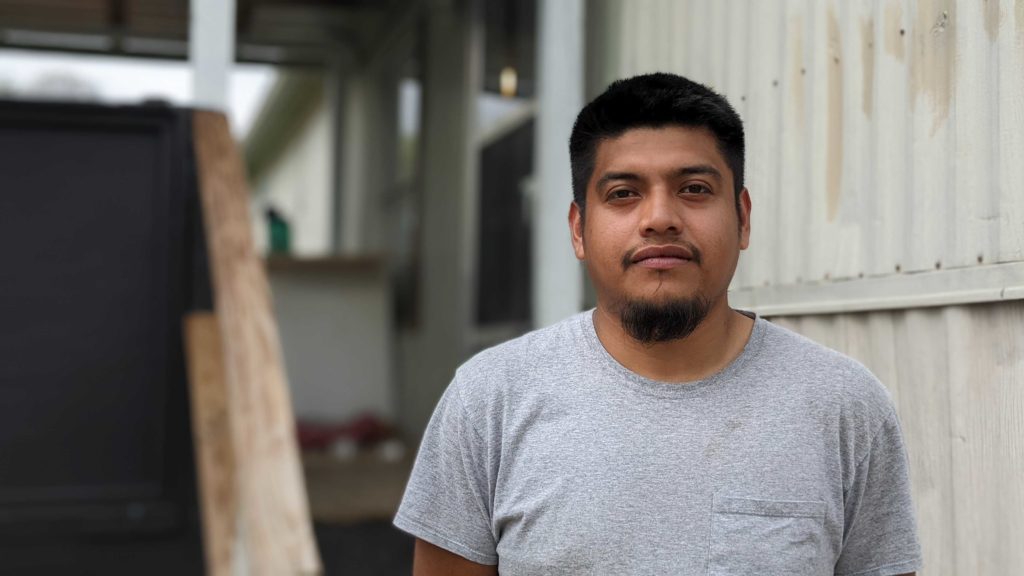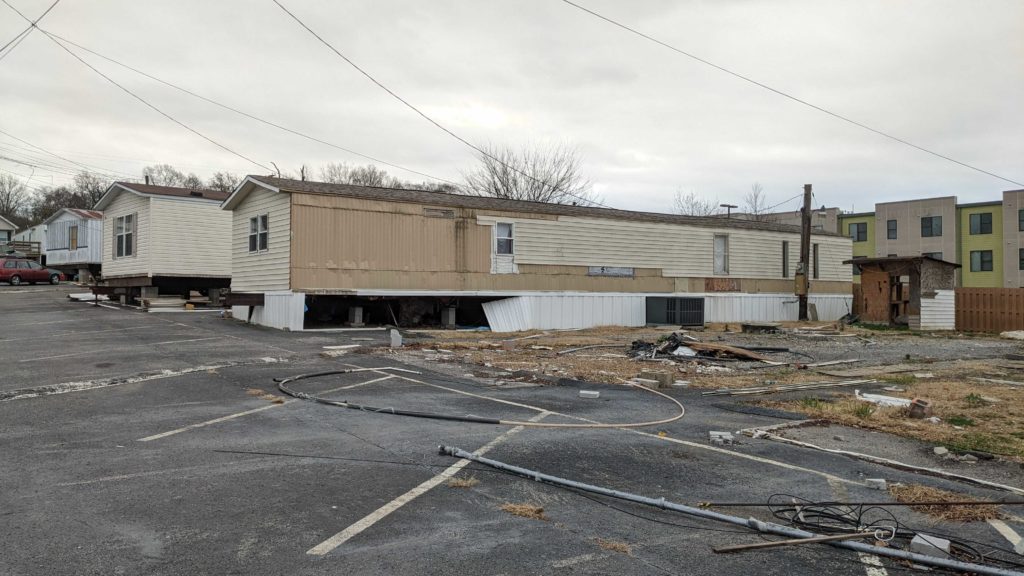
This story is part of our ongoing coverage on the rising cost of housing in Middle Tennessee. See all our housing coverage at wpln.org/housing.
José Ricardo Ballona is standing on the front porch, waiting for the kids to get home from school on a recent afternoon at his new place in rural Sumner County.
He moved to Millersville late last year, after his mobile home park on Dickerson Road in East Nashville was sold to a developer.
“Fue algo muy difícil,” Ballona says. It was really difficult.
For one thing, it’s more expensive. At his old place, he paid about $500 a month in rent for his plot, and he owned the trailer. He says he put a lot of work into the old place, too — hardwood floors, granite counters. But he couldn’t find a place to move it or find anybody willing to buy it from him, so he had to leave it behind.
 Alexis Marshall WPLN News
Alexis Marshall WPLN NewsThis is the view from Ballona’s old mobile home park after most families had already moved away.
Residents from the tenants’ union Dickerson Road United in Struggle did manage to negotiate compensation from the developer.
But, Ballona says, “Lo que me dieron ahí solo me sirvió para dar el down para esta trailer.” The money he got only covered the down payment on his new trailer. Now he’s paying for the lot and paying off a new mobile home. His monthly housing costs have doubled.
The move also put him farther away from work near Nolensville Pike, where he did marble countertops. The commute in his pickup truck that used to take 15 minutes, stretched to more than 40. Now he’s decided to work for himself for better pay and opportunities.
Another challenge for Ballona’s family: his son Aron had to change schools halfway through the academic year. While he was fidgeting shyly on the porch, with a purple popsicle in his hands, he said that it made him feel sad.
“I lost my friends,” he said.
What do the data say?
As Nashville wrestles with a lack of affordable housing, many families have found themselves moving outside of the city for options. According to census data, Davidson County lost tens of thousands of residents to the surrounding counties between 2015 and 2019, even before historic rent increases. The data do not reflect why more people are moving away from Davidson County and into those surrounding it. But the cost of housing may be a factor.
Data are not yet available for how migration changed during the pandemic, when Nashville housing prices skyrocketed. The affordability crisis also affects immigrants, pushing them farther away from the services and communities they rely on.
Lydia Yousief, director of the Elmahaba Center, works with people in Nashville’s Arabic-speaking community, and says many of them are also being priced out of their neighborhoods. She refers to this phenomenon as a “second displacement” for immigrants, who’ve already uprooted their lives from another country.
Isolation for some refugees
Sabina Mohyuddin is executive director for the American Muslim Advisory Council, and has helped with resettlement efforts of Afghan refugees. She says many refugee families are resettled in Nashville communities where they can be near one another, which helps them adjust. But some have had to go outside Davidson County to find affordable housing.
“When you’re living in a place where there aren’t any other Afghans in the school system or there are only few, if any, others in your school, that becomes just harder to navigate, especially if you don’t know the language, don’t know the culture.“
Mohyuddin says being in Nashville gives new arrivals greater access to places of worship and international markets. But it goes beyond that.
“The same things you or I might feel and we’re far away from family and friends, you feel a bit of isolation, especially being new here and that traumatic situation in which they left.”
Mohyuddin says living far from other refugees in the city can cut new arrivals off from their cultural communities, and affect how often refugees get face time with their caseworkers.
It can also affect access to critical social services, like those provided at Neighborhood Health. It offers medical care regardless of a person’s ability to pay. CEO Brian Haile says they’re working to expand to where clients are moving.
“We’re actively looking at how do we open a clinic in Sumner County because we have so many people from Sumner County that are coming to three of our locations in East Nashville. We really want to make services more accessible to them.”
A silver lining for one family
Back in Sumner County, José Ricardo Ballona says his children’s pediatrician is no longer an easy drive away. The Veracruz native is no longer in walking distance of a truck to buy tortas or a Hispanic market, like he used to be. But he considers himself lucky compared to other tenants who were displaced from the old mobile home park.
“Para mí fue un poco mejor. Pero para otras personas que no tuvieron la misma suerte, tuvieron que ir a vivir al apartamento.”
He says some of them had to move to apartments, which typically have less outdoor space. At least here, Ballona was able to find a trailer with a yard. And it’s in the same park as some family members, including a couple around his son’s age.
When Aron gets home from school, he and his cousin climb onto the trampoline out back. They giggle and bounce until they’re breathless.
 Alexis Marshall WPLN News
Alexis Marshall WPLN NewsJosé Ricardo Ballona supervises in the backyard as his son and niece play on the trampoline.

